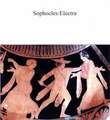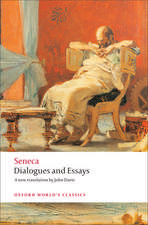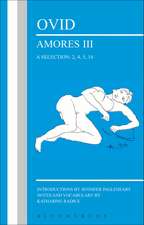Seneca: Oedipus: Companions to Greek and Roman Tragedy
Autor Professor Susanna Braunden Limba Engleză Paperback – 16 dec 2015
| Toate formatele și edițiile | Preț | Express |
|---|---|---|
| Paperback (1) | 150.96 lei 3-5 săpt. | |
| Bloomsbury Publishing – 16 dec 2015 | 150.96 lei 3-5 săpt. | |
| Hardback (1) | 536.72 lei 6-8 săpt. | |
| Bloomsbury Publishing – 16 dec 2015 | 536.72 lei 6-8 săpt. |
Din seria Companions to Greek and Roman Tragedy
- 14%
 Preț: 163.24 lei
Preț: 163.24 lei - 9%
 Preț: 150.96 lei
Preț: 150.96 lei - 7%
 Preț: 163.71 lei
Preț: 163.71 lei -
 Preț: 163.24 lei
Preț: 163.24 lei - 14%
 Preț: 163.24 lei
Preț: 163.24 lei - 14%
 Preț: 163.42 lei
Preț: 163.42 lei - 14%
 Preț: 163.24 lei
Preț: 163.24 lei - 7%
 Preț: 163.71 lei
Preț: 163.71 lei - 14%
 Preț: 163.24 lei
Preț: 163.24 lei -
 Preț: 163.34 lei
Preț: 163.34 lei - 8%
 Preț: 152.01 lei
Preț: 152.01 lei - 7%
 Preț: 163.71 lei
Preț: 163.71 lei - 15%
 Preț: 150.59 lei
Preț: 150.59 lei - 14%
 Preț: 163.71 lei
Preț: 163.71 lei -
 Preț: 163.71 lei
Preț: 163.71 lei - 15%
 Preț: 162.54 lei
Preț: 162.54 lei - 24%
 Preț: 150.59 lei
Preț: 150.59 lei - 14%
 Preț: 172.27 lei
Preț: 172.27 lei - 15%
 Preț: 176.07 lei
Preț: 176.07 lei - 23%
 Preț: 234.44 lei
Preț: 234.44 lei -
 Preț: 163.71 lei
Preț: 163.71 lei - 7%
 Preț: 164.05 lei
Preț: 164.05 lei -
 Preț: 150.59 lei
Preț: 150.59 lei - 14%
 Preț: 163.52 lei
Preț: 163.52 lei - 14%
 Preț: 164.40 lei
Preț: 164.40 lei - 14%
 Preț: 163.34 lei
Preț: 163.34 lei - 15%
 Preț: 150.33 lei
Preț: 150.33 lei - 14%
 Preț: 169.62 lei
Preț: 169.62 lei - 24%
 Preț: 170.42 lei
Preț: 170.42 lei - 24%
 Preț: 163.24 lei
Preț: 163.24 lei - 24%
 Preț: 157.41 lei
Preț: 157.41 lei - 24%
 Preț: 150.68 lei
Preț: 150.68 lei
Preț: 150.96 lei
Preț vechi: 165.01 lei
-9% Nou
Puncte Express: 226
Preț estimativ în valută:
28.89€ • 30.05$ • 23.85£
28.89€ • 30.05$ • 23.85£
Carte disponibilă
Livrare economică 24 martie-07 aprilie
Preluare comenzi: 021 569.72.76
Specificații
ISBN-13: 9781474234788
ISBN-10: 147423478X
Pagini: 176
Dimensiuni: 138 x 216 x 13 mm
Greutate: 0.23 kg
Editura: Bloomsbury Publishing
Colecția Bloomsbury Academic
Seria Companions to Greek and Roman Tragedy
Locul publicării:London, United Kingdom
ISBN-10: 147423478X
Pagini: 176
Dimensiuni: 138 x 216 x 13 mm
Greutate: 0.23 kg
Editura: Bloomsbury Publishing
Colecția Bloomsbury Academic
Seria Companions to Greek and Roman Tragedy
Locul publicării:London, United Kingdom
Caracteristici
Latest installment in Bloomsbury's well-established series that provides essential guidance about the crucial issues relating to Greek and Roman tragedy
Notă biografică
Susanna Morton Braund is Professor of Latin Poetry and Its Reception at University of British Columbia, Vancouver, Canada. She has published extensively on Roman satire, Latin epic poetry and Seneca.
Cuprins
Acknowledgments Chapter One: The MythChapter Two: Seneca in his TimeChapter Three: Structure, Themes and IssuesChapter Four: Reception and Influence of Seneca's OedipusGuide to Further ReadingBibliographyIndex
Recenzii
What makes Braund's Companion stand out is the depth of her interpretation, the powerful section on the reception of this play, and her sure guidance through aspects of the play that are puzzling or difficult to explain. ... This is a fine introduction to Seneca's play and will benefit students and scholars alike.
[Braund] has produced a clear and comprehensive companion to Seneca's Oedipus.
In this short study of Seneca's Oedipus Susanna Braund has made a significant contribution to the steadily growing study of Senecan tragedy and its reception.
[Braund] has made a valuable contribution towards raising the profile of this unconventional tragedy.
Braund's Oedipus not only introduces readers to the complexities of this distinctively Roman tragedy, but cuts a fascinating path through the remarkable story of its reception from earlier English and French drama through to Freud, Stravinsky and Ted Hughes and on to theatre and film in the twenty-first century.
It is hard to imagine any study of Seneca's Oedipus of these dimensions that could match Susana Braund's highly readable style of presentation, her breadth of coverage in locating the drama in its Roman historical, cultural and sociological context, her insightful probing of the drama's thematic complexities, and the conciseness with which she relates the Oedipus both to the Greco-Roman literary past and to the drama's reception in later ages. Seneca's Oedipus has drawn significant scholarly attention in recent times, but Braund's individuality of vision and voice sets this volume apart.
It would be hard to think of a more refreshing and revealing case-study in tragic myth than Seneca's Oedipus. Braund is a generous guide to student and scholar alike. She introduces the play in its original Roman context, opens it up for new interpretation, compares it with better-known and lesser-known versions, and traces its fascinating influence from antiquity to the present day.
Braund's treatment of the question of Senecan tragedy's ancient performance amounts to a masterful précis of this vexed scholarly debate, into which she manages to introduce decisive clarity . Braund's volume constitutes an exemplary addition to the expanding corpus of 'companions' or 'handbooks' to classical literary texts. In fact, I have never encountered a work of this genre that does a better job of 'opening up' for students the text it addresses. Braund's treatment of themes in chapter 3 deserves special mention. She isolates a set of themes that are urgently relevant to Seneca's Oedipus and whose identification has the added benefit of being hermeneutically provocative. Moreover, Braund's discussion of them, which usually amounts to brief analytical comments on a handful of relevant passages, gives students a sense of the sort of additional textual evidence they might adduce, as well as of how they might pursue sustained interpretations of these or related themes on their own.
[Braund] has produced a clear and comprehensive companion to Seneca's Oedipus.
In this short study of Seneca's Oedipus Susanna Braund has made a significant contribution to the steadily growing study of Senecan tragedy and its reception.
[Braund] has made a valuable contribution towards raising the profile of this unconventional tragedy.
Braund's Oedipus not only introduces readers to the complexities of this distinctively Roman tragedy, but cuts a fascinating path through the remarkable story of its reception from earlier English and French drama through to Freud, Stravinsky and Ted Hughes and on to theatre and film in the twenty-first century.
It is hard to imagine any study of Seneca's Oedipus of these dimensions that could match Susana Braund's highly readable style of presentation, her breadth of coverage in locating the drama in its Roman historical, cultural and sociological context, her insightful probing of the drama's thematic complexities, and the conciseness with which she relates the Oedipus both to the Greco-Roman literary past and to the drama's reception in later ages. Seneca's Oedipus has drawn significant scholarly attention in recent times, but Braund's individuality of vision and voice sets this volume apart.
It would be hard to think of a more refreshing and revealing case-study in tragic myth than Seneca's Oedipus. Braund is a generous guide to student and scholar alike. She introduces the play in its original Roman context, opens it up for new interpretation, compares it with better-known and lesser-known versions, and traces its fascinating influence from antiquity to the present day.
Braund's treatment of the question of Senecan tragedy's ancient performance amounts to a masterful précis of this vexed scholarly debate, into which she manages to introduce decisive clarity . Braund's volume constitutes an exemplary addition to the expanding corpus of 'companions' or 'handbooks' to classical literary texts. In fact, I have never encountered a work of this genre that does a better job of 'opening up' for students the text it addresses. Braund's treatment of themes in chapter 3 deserves special mention. She isolates a set of themes that are urgently relevant to Seneca's Oedipus and whose identification has the added benefit of being hermeneutically provocative. Moreover, Braund's discussion of them, which usually amounts to brief analytical comments on a handful of relevant passages, gives students a sense of the sort of additional textual evidence they might adduce, as well as of how they might pursue sustained interpretations of these or related themes on their own.

















